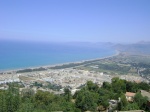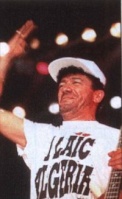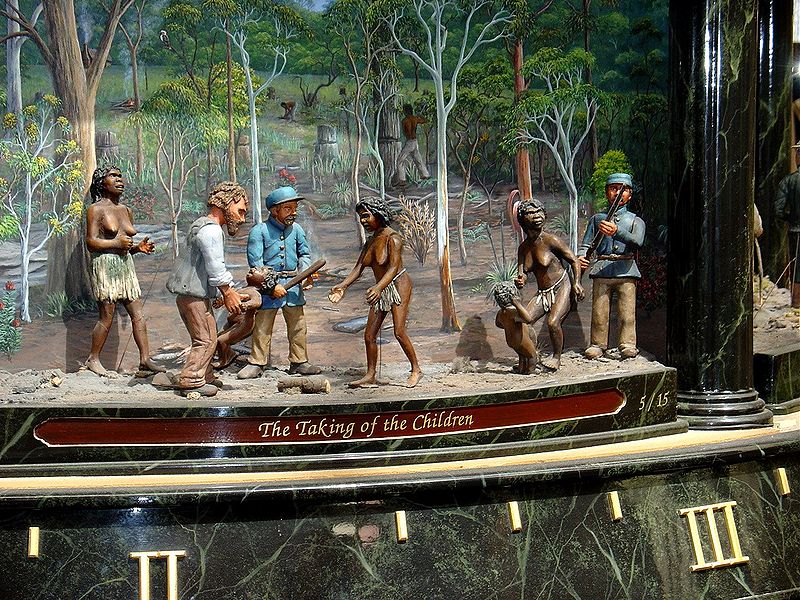Stolen Generations (générations volées)
4 participants
Page 1 sur 1
 Stolen Generations (générations volées)
Stolen Generations (générations volées)
Les colons de l'Australie n'etaient pas fiers par le fait que les aborigenes existent en Australie. Quoi faire, les exterminer! ou comment faire, les blancs d'Australie ne peuvent pas tolerer d'avoir la méme nationalité que ces "creatures".... alors, ils furent comme méme clément (rire), ils ont decidé d'exterminer les adultes et sauver les enfants. ils ont volé la progéniture des natifs de l'Australie pour les jeter à l'ecole des blancs et faire d'eux des Autraliens comme le souhaitait James Cook et consorts... le pouvoir algerien n'essaye pas de réediter ce scénario en Algerie à travers l'ecole de Benbouzid?
Dernière édition par Zhafit le Mer 23 Fév - 23:28, édité 1 fois

Zhafit- Admin
- Nombre de messages : 13508
Date d'inscription : 26/04/2008
 Re: Stolen Generations (générations volées)
Re: Stolen Generations (générations volées)
C'est l'un des quelques travaux que font nos dirigeants à la perfection; détruire l'avenir des jeunes et détruire tous leurs rêves. Ils savent que la jeunesse d'aujourd'hui est la force de demain est donc, une éventuelle menace pour leurs intérêts. donc pourquoi ne pas les détruire maintenant en tant que petit sans aucune résistance. comme ça ils seront plus facile à manipuler et écarter de leur route et bien sûr garder leur place et préparer ceux qui leur semblent bons.
Dernière édition par aokas le Lun 14 Mar - 16:16, édité 1 fois

aokas- Nombre de messages : 416
Date d'inscription : 19/03/2010

Zhafit- Admin
- Nombre de messages : 13508
Date d'inscription : 26/04/2008
 Re: Stolen Generations (générations volées)
Re: Stolen Generations (générations volées)
Stolen Generations
From Wikipedia, the free encyclopedia
Jump to: navigation, search
"Stolen Children" redirects here. For the film, see The Stolen Children.


A fictional portrayal entitled The Taking of the Children on the 1999 Great Australian Clock, Queen Victoria Building, Sydney, by artist Chris Cook.
The Stolen Generations (also Stolen children) is a term used to describe the children of Australian Aboriginal and Torres Strait Islander descent who were removed from their families by the Australian Federal and State government agencies and church missions, under acts of their respective parliaments. The removals occurred in the period between approximately 1869[1] and 1969,[2][3] although in some places children were still being taken in the 1970s.[4]
The extent of the removal of children, and the reasoning behind their removal, are contested. Documentary evidence, such as newspaper articles and reports to parliamentary committees, suggest a range of rationales. Motivations evident include child protection, beliefs that given their catastrophic population decline after white contact that black people would "die out",[5] a fear of miscegenation by full blooded aboriginal people[6]. Terms such as "stolen" were used in the context of taking children from their families – the Hon P. McGarry, a member of the Parliament of New South Wales, objected to the Aborigines Protection Amending Act 1915 which then enabled the Aborigines' Protection Board to remove Aboriginal children from their parents without having to establish that they were in any way neglected or mistreated; McGarry described the policy as "steal[ing] the child away from its parents".[7] In 1924,[8] in the Adelaide Sun an article stated "The word 'stole' may sound a bit far-fetched but by the time we have told the story of the heart-broken Aboriginal mother we are sure the word will not be considered out of place."[9][10]
Indigenous Australians in most jurisdictions were "protected", effectively being wards of the State.[11][12] The protection was done through each jurisdictions' Aboriginal Protection Board; in Victoria and Western Australia these boards were also responsible for applying what were known as Half-caste acts.
More recent usage was Peter Read's 1981 publication of The Stolen Generations: The Removal of Aboriginal children in New South Wales 1883 to 1969.[3] The 1997 publication of Bringing Them Home – Report of the National Inquiry into the Separation of Aboriginal and Torres Strait Islander Children from Their Families[13] brought broader awareness of the Stolen Generations. The acceptance of the term in Australia is illustrated by the 13 February 2008 formal apology to the Stolen Generations,[14] led by Prime Minister Kevin Rudd, and passed by both houses of the Parliament of Australia. Previous apologies had been offered by State and Territory governments in the period 1997–2001.[15] However, there remains opposition to acceptance of the validity of the term "Stolen Generations". This was illustrated by the former Prime Minister John Howard refusing to apologise and the then Minister for Aboriginal and Torres Strait Islander Affairs, John Herron controversially disputing the usage in April 2000.[16] Others who dispute the validity of the term include: Peter Howson, Minister for Aboriginal Affairs in 1971–72, Keith Windschuttle and Andrew Bolt[17] Others argue against these critics, responding to Windschuttle and Bolt in particular.[
read more
http://en.wikipedia.org/wiki/Stolen_Generations
From Wikipedia, the free encyclopedia
Jump to: navigation, search
"Stolen Children" redirects here. For the film, see The Stolen Children.


A fictional portrayal entitled The Taking of the Children on the 1999 Great Australian Clock, Queen Victoria Building, Sydney, by artist Chris Cook.
The Stolen Generations (also Stolen children) is a term used to describe the children of Australian Aboriginal and Torres Strait Islander descent who were removed from their families by the Australian Federal and State government agencies and church missions, under acts of their respective parliaments. The removals occurred in the period between approximately 1869[1] and 1969,[2][3] although in some places children were still being taken in the 1970s.[4]
The extent of the removal of children, and the reasoning behind their removal, are contested. Documentary evidence, such as newspaper articles and reports to parliamentary committees, suggest a range of rationales. Motivations evident include child protection, beliefs that given their catastrophic population decline after white contact that black people would "die out",[5] a fear of miscegenation by full blooded aboriginal people[6]. Terms such as "stolen" were used in the context of taking children from their families – the Hon P. McGarry, a member of the Parliament of New South Wales, objected to the Aborigines Protection Amending Act 1915 which then enabled the Aborigines' Protection Board to remove Aboriginal children from their parents without having to establish that they were in any way neglected or mistreated; McGarry described the policy as "steal[ing] the child away from its parents".[7] In 1924,[8] in the Adelaide Sun an article stated "The word 'stole' may sound a bit far-fetched but by the time we have told the story of the heart-broken Aboriginal mother we are sure the word will not be considered out of place."[9][10]
Indigenous Australians in most jurisdictions were "protected", effectively being wards of the State.[11][12] The protection was done through each jurisdictions' Aboriginal Protection Board; in Victoria and Western Australia these boards were also responsible for applying what were known as Half-caste acts.
More recent usage was Peter Read's 1981 publication of The Stolen Generations: The Removal of Aboriginal children in New South Wales 1883 to 1969.[3] The 1997 publication of Bringing Them Home – Report of the National Inquiry into the Separation of Aboriginal and Torres Strait Islander Children from Their Families[13] brought broader awareness of the Stolen Generations. The acceptance of the term in Australia is illustrated by the 13 February 2008 formal apology to the Stolen Generations,[14] led by Prime Minister Kevin Rudd, and passed by both houses of the Parliament of Australia. Previous apologies had been offered by State and Territory governments in the period 1997–2001.[15] However, there remains opposition to acceptance of the validity of the term "Stolen Generations". This was illustrated by the former Prime Minister John Howard refusing to apologise and the then Minister for Aboriginal and Torres Strait Islander Affairs, John Herron controversially disputing the usage in April 2000.[16] Others who dispute the validity of the term include: Peter Howson, Minister for Aboriginal Affairs in 1971–72, Keith Windschuttle and Andrew Bolt[17] Others argue against these critics, responding to Windschuttle and Bolt in particular.[
read more
http://en.wikipedia.org/wiki/Stolen_Generations

Zhafit- Admin
- Nombre de messages : 13508
Date d'inscription : 26/04/2008
 Re: Stolen Generations (générations volées)
Re: Stolen Generations (générations volées)
waquila ,au canada ,plus précisément au qébéc ,c'est la même politique suivie avec quelques nuances pour ne pas dévoiler le fond de leur politique ,et dire que nos immigrés sont partis zaama se sacrifier pour leur progéniture et leur enfants adoptifs sans le savoir
ça sera vraiment leur plus grande décéption dans leur vie ,de voir leur propre enfants leur tournés le dos à eux et à leur culture kabylo_algérienne
c'est le cauchemard à venir
ça sera vraiment leur plus grande décéption dans leur vie ,de voir leur propre enfants leur tournés le dos à eux et à leur culture kabylo_algérienne
c'est le cauchemard à venir
 Re: Stolen Generations (générations volées)
Re: Stolen Generations (générations volées)
la secte arabo-baathiste fait tout pour voler nos enfants 

laic-aokas- Nombre de messages : 14024
Date d'inscription : 03/06/2011
 Re: Stolen Generations (générations volées)
Re: Stolen Generations (générations volées)
quand on a comme statégie globale la désinformation et l'intox , cela s'appele foncer droit dans le mur ,car quelque part au fond de nous mêmes ,on sait que le projet qu'on porte n'a aucune chance d'aboutir.
c'est un peu comme une béte sauvage blessée ,se sachant condamner à mourrir essaye de faire un maximum de dégats ,c'est le cas actuellement des démocrates et des laics .
c'est un peu comme une béte sauvage blessée ,se sachant condamner à mourrir essaye de faire un maximum de dégats ,c'est le cas actuellement des démocrates et des laics .
 Re: Stolen Generations (générations volées)
Re: Stolen Generations (générations volées)
laicité=avenir de l'humanité

laic-aokas- Nombre de messages : 14024
Date d'inscription : 03/06/2011
 Sujets similaires
Sujets similaires» Deux Génerations, méme combat
» Aokas: qui pense aux générations futures?
» Les nouvelles générations bientôt au pouvoir
» quel héritage pour les générations futures ?
» Classement des universités algériennes dans le monde...
» Aokas: qui pense aux générations futures?
» Les nouvelles générations bientôt au pouvoir
» quel héritage pour les générations futures ?
» Classement des universités algériennes dans le monde...
Page 1 sur 1
Permission de ce forum:
Vous ne pouvez pas répondre aux sujets dans ce forum

